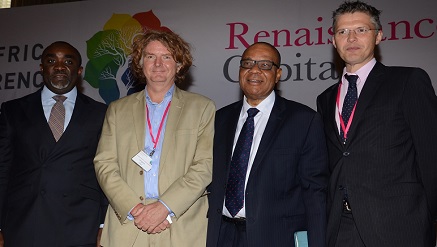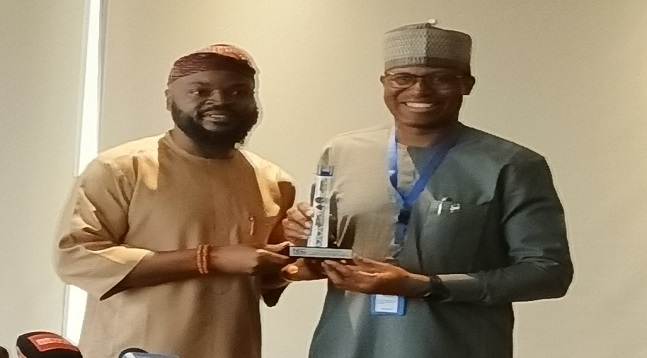Telecom
Smile Communications Says Nigeria Well-Positioned for Digital Economy

Smile Communications Nigeria Limited, the 4G LTE broadband provider of choice, has described the Nigeria’s digital economy as huge, and will impact virtually all segments of the economy.
‘Digital Economy’ was coined by Don Tapscott in 1995 to imply an economy chiefly triggered by digital computing technologies.
Thus, in the face of dwindling oil revenue with increasingly pressure on the economy evident in budgets deficit, infrastructural deficit, high unemployment rate, harsh business environment, corruption, amongst others, Mr. Michiel Buitelaar, managing director, Smile Communications Nigeria Limited, said that leveraging digital economy should be regarded as a sine qua non in sustaining the economy by the incoming administration led by Muhammed Buhari.
Buitelaar who was speaking during a panel discussion at the sixth (6th) Annual Pan-African 1:1 Investor Conference organized by Renaissance Capital in Lagos, identified infrastructural advancement as overriding factor for the immediate expansion of sectors such as agriculture, transportation, banking & finance, health-care/medicine, and education.
He said that Smile Communications aligns itself with the key statistics expected for the Nigerian Digital Economy by 2018 as released by the Federal Ministry of Communication Technology, especially for the emergence of an industry that is less fragmented.
According to the country’s target, the industry expects to attain 30 per cent broadband penetration by 2018 from the present less than 10 per cent.
The Smile MD said, “There are various advantages the digital economic providers have over the traditional. However, to make this happen faster, there are catalysts required for it to even drive other sectors outside the ICT. Digital economy will be the driver of the agricultural, transport, health-care/medicine, education, banking & finance, among others. In our company, for instance, we are talking to companies in those sectors and one recently said that ‘the software is eating the world’.
“We do believe the new digital ICT will influence other sectors. For example, in agriculture; like I have seen in other countries, the efficiency and productivity is very likely to explode once all the digital economy has entered into their arena. It is also our expectation that the impact will become more pronounced within the next ten years. For emphasis sake, sectors like agricultural, transport, health-care/medicine, education, commerce, in fact, the whole move of digitization will have impact on the emerging economy and Nigeria’s economy is well positioned to make their journey better than many others,” the Smile Communications boss said.
Specifically on expected broadband impact on digital economy, Buitelaar, extolled the outgoing administration of President Goodluck Jonathan for approving the National Broadband Plan (NBP), expressing confidence in the Buhari government’s compelling posture for firm implementation of the plans.
“I think the Federal Government is doing a quite well, especially, by releasing a National Broadband Plan (NBP), but I will argue that the next Government continues with the plan in an even ‘forceful’ manner. Similarly, spectrum allocations should be looked at too; it is more of technical, but very important in the nation’s quest for more ubiquitous broadband. There are sub-sectors that the broadband availability will immediately impact their operations such as the delivery viz a viz ecommerce, e-payment, education and other clusters of business. These are crucial reasons the digital economy should be allowed to blossom,” he said.
“Having been here for six months, Nigeria is a wonderful country. At the same time, the incoming government should do something as regards the image of the country and perception in the rest of the world. That alone is capable of convincing foreign investors about the country’s business climate. Secondly, on infrastructure, I do believe that the whole country will benefit in smart investments in infrastructure. There are issues in transport, power and payment systems; if these issues can be addressed, with a couple of other commitments, I believe in the next few years the country will be reaping large chunk of benefits from them,” he said.
Buitelaar added that the Company will not rest on its oars until Nigerians have access to qualitative and affordable broadband services.
He said, “From the Smile Communications’ perspective, we have penchant interest in the provision of high quality service. Later this year we will rollout service in a couple of other cities. We are serious about providing superfast broadband, high availability, high-quality and reliable offering, because Nigerians deserve qualitative service. If a small scale business is using your service, they ought to get maximum benefit; that is the way they can grow and employ more people. In that way you have impacted lives and the country’s GDP will feel the boost as well”.
Earlier, the Keynote speaker, Professor Pat Utomi, while addressing investors and captains of industries at the Conference, shared similar views with Mr. Buitelaar.
He said that thrust of the in-coming administration should be centered on making corruption costly and unattractive through public service entrepreneurship and goal oriented; reinvent sectors like mining and building clusters of strong institutions, leveraging ICT, among others.
Also, Global Chief Economist at Renaissance Capital, Mr. Charles Robertson, noted: “We see great long-term potential across Africa, particularly, in Nigeria, Kenya and Egypt.”
“We believe Nigeria will be a trillion dollar economy by 2025 and it will keep doubling in size every 10 years. GDP per capita is likely to reach around $15,000 by 2050. Following the April elections, the new government represents the best opportunity in recent years to push forward reform for Africa’s largest economy,” he said.
The sixth (6th) Annual Pan-African 1:1 Investor Conference organized by Renaissance Capital in Lagos attracted over 150 investors representing both global and frontier funds and 50 companies from across the African continent.
Smile Communications Nigeria Limited was founded in 2007 with the transformative objective of using the best and most innovative technologies to provide its customers with high quality, easy to use and affordable communication services.
Its vision and mission is to be the broadband provider of choice in Nigeria and enable its customers to fully benefit from the Internet world. Smile launched West Africa’s first true 4G LTE network in Ibadan in 2013 thereby revolutionizing the way people access the Internet.
Telecom
Banks, Telcos Settle Four-Year Dispute over N300Bn USSD Debt

Banks and telecommunications operators in Nigeria have ended a four-year dispute over nearly N300bn owed for Unstructured Supplementary Service Data services (USSD), with the debt now fully cleared, according to Association of Licensed Telecommunications Operators of Nigeria (ALTON).

Gbenga Adebayo, chairman, announced the resolution on Thursday during an official visit to Idris Olorunnimbe, chairman, Nigerian Communications Commission (NCC).
He credited the intervention of the NCC, led by Dr Aminu Maida, executive vice chairman of the commission, with bringing the long-standing dispute to a close.
“When Dr Maida assumed office, he inherited significant industry challenges,” Adebayo said.
“One of the most difficult was the USSD debt crisis, a debt burden that grew over four years to nearly N300bn. It had become a systemic risk to our sector and the digital financial ecosystem.
Through firm leadership, structured engagement, and decisive coordination, Dr Maida and his team resolved this issue.
Today, there is no outstanding USSD debt. The ecosystem has fully migrated to end-user billing. What was once a looming crisis has been converted into a sustainable framework.”
The clearing of the debt ends years of accusations and counter-accusations between banks and telecom operators, which had threatened the stability of digital financial services in the country.
Adebayo praised the NCC’s leadership for steering the telecom sector through one of its most delicate periods, noting other interventions, including last year’s approval of a 50 per cent USSD tariff.
He described the resolution of the debt crisis as a milestone for the telecom and digital finance ecosystem, ensuring sustainability and predictability for operators and service providers.
Nigeria’s telco and bank billing for USSD services transitioned to the end-user billing model in mid-2025, moving charges from bank accounts to customers’ mobile airtime, which is deducted directly by telecom operators.
This shift resolved the long-standing dispute in which banks owed operators up to N300bn in unpaid USSD fees.
The transition arose from years of tension between telecom operators, including MTN and Airtel, and banks over USSD revenue sharing, with debts peaking at N250–300bn by 2024.
The NCC, in collaboration with the Central Bank of Nigeria, developed the EUB framework to standardise billing, enhance transparency, and support financial inclusion for unbanked users who rely heavily on USSD codes.
Under the EUB system, charges are now deducted directly from mobile airtime at N6.98 per session lasting up to 120 seconds, with user consent prompts issued before each deduction. Banks no longer bill for USSD services; telcos handle them exclusively, with regulatory safeguards preventing double-billing. Users can opt in or out of the service, and banks are required to notify customers in advance of any USSD session charges.
Migration to the EUB model began between June 3 and 18, 2025, following partial debt repayments amounting to N171bn. By February 19, 2026, banks had fully cleared the remaining debt, solidifying the EUB rollout.
The model improves user control through immediate airtime deductions and session notifications, similar to voice and SMS billing. While some critics have expressed concern over potential burdens on low-income users, the transition strengthens telecom revenue sustainability and contributes to the stability of Nigeria’s digital financial ecosystem.
Credit: Punch
Telecom
MTN, FAAN Unveil Free WiFi @ Lagos, Abuja Airports

Federal Airports Authority of Nigeria (FAAN) and MTN Nigeria have launched free, high-speed WiFi services for passengers at the international wing of the Murtala Muhammed Airport in Lagos and the Nnamdi Azikiwe International Airport in Abuja.

The partnership, both bodies explained, will be followed up with similar development taking place at the airports in Kano, Port Harcourt and Enugu within the next few months.
Mrs Olubunmi Kuku, managing director of FAAN, officially unveiled the internet service at MMIA Terminal two.
Kuku, who was represented by Capt. Abdullahi Mahmood, director of Airport Operations, described the initiative as a major milestone partnership for the aviation ecosystem.
The FAAN boss said the milestone marked a new benchmark in digital infrastructure and passenger experience across Nigerian airports.
According to her, the free WiFi service will be extended to the MMIA Temporary Terminal within weeks, before extension to Enugu, Port Harcourt, and Kano international airports over the next three months.
“In 21st century Nigeria, no Nigerian airport should be an offline island.
“This collaboration with MTN Nigeria demonstrates how effective Public-Private Partnership (PPP) alignment can modernise infrastructure and strengthen the country’s digital economy,” she said.
Kuku assured travellers that FAAN was committed to closing service gaps and enhancing operational efficiency across airports nationwide.
“This WiFi is our promise that FAAN is listening. We have turned on the signal today, but the signal we are truly sending is this: Nigerian aviation is writing a new chapter; one of innovation, partnership, and unwavering commitment to excellence,” she said.
Kuku said the project was a key component of the digital economy agenda led by President Bola Tinubu and the transformative vision of Mr Festus Keyamo, minister of Aviation.
She commended MTN Nigeria for its technical expertise and investment in the project, describing the partnership as purpose-driven and transformative.
On his part, Mr Karl Toriola, chief executive officer of MTN Nigeria, who was represented by Lynda Saint-Nwafor, chief enterprise business officer, assured passengers that the service would be reliable, secure and efficient.
“We are proud to announce the launch of a free WiFi service across major airports in Nigeria in partnership with FAAN.
“This initiative reflects a shared commitment to improving passenger experience and enhancing digital accessibility,” Toriola said.
He noted that airports served as critical gateways for business travellers, tourists, airport personnel and service providers, all of whom required seamless connectivity.
“With this service, travellers waiting to board, in transit, or upon arrival can now stay connected freely and effortlessly,” he added.
MTN Nigeria also announced plans to activate on-ground engagement campaigns at the Lagos and Abuja airports over the next month to drive awareness and encourage usage.
According to the telecom giant, the project reinforces its commitment to national infrastructure development and expanding digital access in public spaces.
Telecom
NCC Mulls Sanction on Road Contractors Destroying Metro Fibre of Telcos

Nigerian Communications Commission (NCC) is considering imposing sanction on any road contractor that destroys telecommunications metro fibre across the country.

Idris Olorunnimbe, chairman, Board of Commissioners, NCC, stated this at congratulatory visit to the Chairman by members of Association of Licensed Telecommunications Operators of Nigeria (ALTON) in Lagos yesterday.
According to him, “I think what we need to do to address the damage of metro fibre by government contractors is simply. He who cuts It must fix it, and we’ll take this message to our state governments.
If any contractor knows that if they damage that critical national infrastructure, their work is going to stop and they are going to be the ones to fix it, they will not destroy it.
Responding, Engr. Gbenga Adebayo, chairman, Association of Licensed Telecommunications Operators of Nigeria (ALTON), said up until now, there are no consequences for those infractions, and if there are no consequences, the tendency to continue to do bad is very high.
“Contractors of government carrying out roadworks, whether road maintenance or road expansion, and their machines destroy communications super highway at will, if there are consequences, or if there were consequences some of those actions will not have escalated to the level that we are in.
“What the chairman has said today is very important, if you destroy it you fix it. What we are expecting now is that the consequence of managing those problems will be a lot more, and there will be legal deterrent for people from destroying operators’ fibre. I must emphasize the communication super highway. That’s the highway by which all the signals are carried.
“When this highway is broken, it’s like you have a major bridge that’s broken. You can’t reach east, neither can you reach west. And until we take it as the major super communications highway and so protective, we will continue to be where we are.
“That’s actually what it is. When this highway is broken, we are all affected. So, it’s no longer an infrastructure that is for operators, but it belongs to all of us. If I don’t have service on my phone, some of these are the consequence of this violation that we are seeing.
Earlier in his welcome address, Engr. Adebayo highlighted some of the key challenges in the sector which includes: Daily fibre cuts — often caused by federal and state road construction contractors — are creating enormous economic losses.
- Nationwide service disruptions
- Destruction of critical digital infrastructure
- Loss of assets without compensation
- Banking, education, and security interruptions
There is currently insufficient institutional recourse for operators when these damages occur. A structured pre-construction fibre mapping and mandatory coordination framework is urgently required.
Key Regulatory Priorities for Sector Stability
- Independence of the Regulator
He said regulatory independence ensures:
- Credible oversight
- Investor confidence
- Transparent decision-making
- Long-term sector stability
Independence must not only exist in law — it must be visible in practice.
“We recommend: Legislative reinforcement explicitly affirming NCC independence
- Clear codification of interaction boundaries between the regulator and supervising authorities
- Operational safeguards insulating regulatory processes from undue influence
Multiple Regulation
Overlapping regulatory interventions by various MDAs on matters already within NCC jurisdiction create:
- Duplicative investigations
- Conflicting directives
- Increased compliance costs
- Regulatory uncertainty
“We recommend structured inter-agency coordination frameworks and legislative clarification reaffirming NCC’s exclusive jurisdiction over telecommunications matters.
Multiple Taxation
Adebayo stated that operators continue to face excessive sub-national taxes and levies.
Enforcement tactics such as site shutdowns directly affect Quality of Service and national connectivity.
A harmonized national telecom taxation framework is essential for broadband expansion and digital inclusion.

 Telecom3 days ago
Telecom3 days agoTerra Moves to Expand in African Drone Sector, Secures $22m Funding

 Telecom3 days ago
Telecom3 days agoTemu Assures Compliance Amid Nigeria Data Privacy Probe

 E-Financial3 days ago
E-Financial3 days agoDMO Offers ₦800bn FGN Bonds in February Auction Surge

 E-Financial3 days ago
E-Financial3 days agoDanjuma, Taj Bank Staff Jailed for 5 Years over N22m Fraud

 E-Financial3 days ago
E-Financial3 days agoKPMG Outlook Reveals Financial Services CEOs Double down on AI, Resilience and Growth in 2026

 E-Financial2 days ago
E-Financial2 days agoEcobank Nigeria Fully Repays $300m Eurobond Notes

 News3 days ago
News3 days agoChianugo, Nigerian $150m suit Against Google, GoDaddy.com Stalled due Judge’s Absence

 E-Financial2 days ago
E-Financial2 days agoZenith Bank Warns Public Over Fake Jim Ovia Investment Videos
























